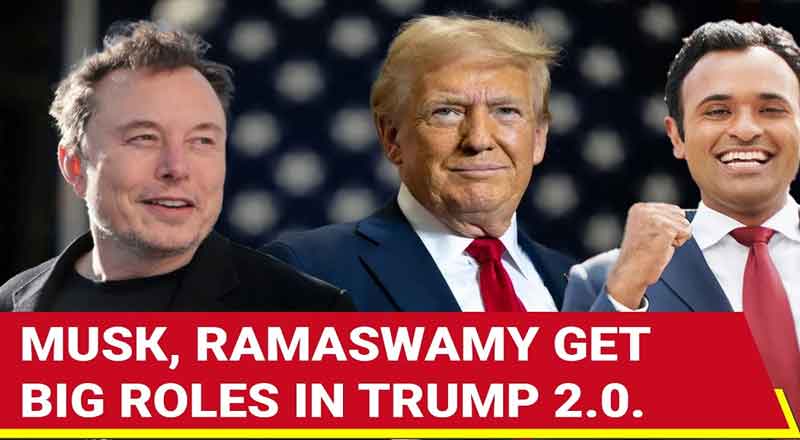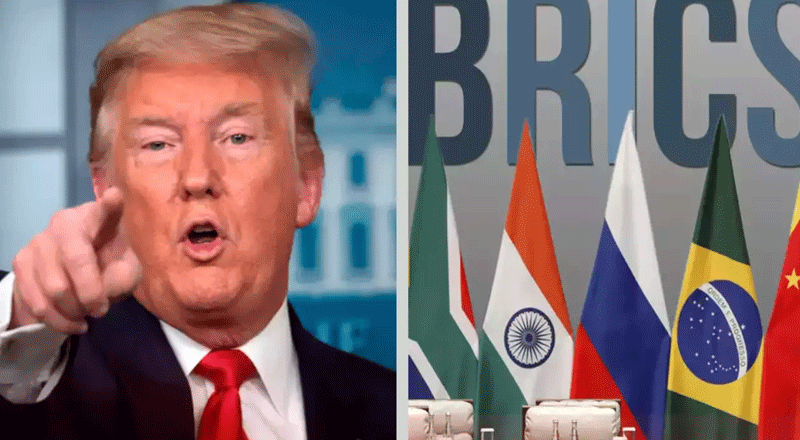Trump’s Vision for Government Efficiency
In a bold move to transform American governance, U.S. President-elect Donald Trump has announced tech billionaire Elon Musk and Indian-American entrepreneur Vivek Ramaswamy will spearhead a revolutionary initiative to streamline the federal bureaucracy. Tasked with heading the newly established Department of Government Efficiency (DOGE), Musk and Ramaswamy are expected to radically reshape government operations, cutting excess spending, and reducing bureaucratic red tape. Trump’s pledge to create a more accountable and efficient government now finds two formidable champions in Musk and Ramaswamy—figures celebrated for their private-sector achievements and commitment to disruptive innovation.
Trump envisions a significantly leaner federal structure by July 4, 2026, as a symbolic “gift” to Americans on the 250th anniversary of the Declaration of Independence. This appointment of two high-profile, private-sector innovators reflects his administration’s broader objective: reducing waste, enhancing transparency, and restoring government accountability to “We the People.”
The Roles of Musk and Ramaswamy
Elon Musk, the world’s richest individual and an outspoken advocate for minimal government intervention, will co-lead this mission with Vivek Ramaswamy, a former Republican presidential candidate and entrepreneur known for his staunch advocacy for free enterprise. According to Trump, both men possess the expertise, vision, and commitment necessary to drive the “Save America” movement, a key component of his political platform.
The Department of Government Efficiency will function as a novel advisory body, working closely with the White House and the Office of Management and Budget (OMB) to identify inefficiencies across federal agencies and propose structural reforms. By tapping into their entrepreneurial backgrounds, Musk and Ramaswamy will implement outside-the-box strategies for dismantling redundant structures and fostering a streamlined, innovation-driven approach within government.
Who Is Vivek Ramaswamy?
Vivek Ramaswamy, the first Indian-American to hold such a significant role in a Trump administration, has a background in biotechnology and public policy. Known for his strong stance on reducing government interference in private business, Ramaswamy has garnered support among conservative circles for his belief that deregulation fuels economic growth. His appointment is particularly noteworthy as he is not only breaking new ground for Indian Americans in Trump’s administration but is also emblematic of Trump’s commitment to fresh leadership perspectives.
The Ambitious Objectives of DOGE
The creation of DOGE reflects long standing Republican aspirations for a streamlined government that prioritizes fiscal responsibility. Musk and Ramaswamy’s primary goals include dismantling excessive regulatory structures, restructuring outdated agencies, and identifying waste within the current $6.5 trillion government budget. These objectives will challenge conventional approaches to government efficiency, with DOGE serving as what Trump has called “the Manhattan Project of the current time.” The team’s work is expected to send “shockwaves” throughout Washington, inspiring resistance among entrenched bureaucratic entities while appealing to advocates for smaller, more efficient government.
Musk’s prior statements about government waste suggest he is prepared to bring a combative, results-driven approach to the role. “This will be a massive shift,” Musk commented, adding that individuals involved in “government waste” should prepare for significant reforms. Ramaswamy’s commitment to slashing regulations aligns seamlessly with Musk’s philosophy, and together, they represent a powerful duo for driving transformative change.
A New Chapter in American Governance?
As Trump begins his second term, Musk and Ramaswamy’s appointments underscore a major commitment to reimagining federal operations. Their work to eliminate waste and overhaul inefficient structures will be closely watched by a public increasingly disillusioned with bureaucratic excess. For many Americans, Trump’s promise of a more accountable government represents hope for a system that prioritizes citizen welfare over administrative stagnation.
By July 4, 2026, DOGE is expected to deliver a federal government that is smaller, more transparent, and more efficient—a “gift” for the nation’s historic anniversary, as Trump envisions. Whether this ambitious endeavor succeeds or faces insurmountable obstacles will ultimately reveal the resilience of America’s federal framework. As Musk and Ramaswamy take on this unprecedented challenge, their progress will likely influence the future of American governance for generations to come.
(With inputs from agencies)





